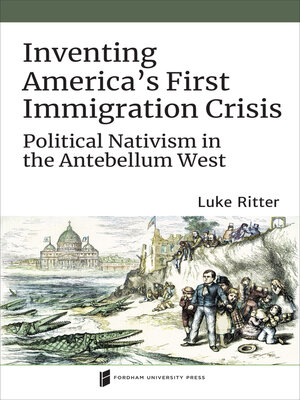Inventing America's First Immigration Crisis
ebook ∣ Political Nativism in the Antebellum West · Catholic Practice In North America
By Luke Ritter

Sign up to save your library
With an OverDrive account, you can save your favorite libraries for at-a-glance information about availability. Find out more about OverDrive accounts.
Find this title in Libby, the library reading app by OverDrive.



Search for a digital library with this title
Title found at these libraries:
| Library Name | Distance |
|---|---|
| Loading... |
This historical study of America's first nativist movement in the mid-nineteenth century sheds important light on today's anti-immigration sentiment.
Why have Americans expressed concern about immigration at some times but not at others? In pursuit of an answer, historian Luke Ritter examines America's response to the rapid influx of immigrants between 1840 and 1860, which culminated in the dramatic rise of the National American Party—otherwise known as the "Know Nothing" Party.
As previous studies have focused on the coasts, historians have yet to explain why the nation's bloodiest anti-immigrant riots erupted in western cities—namely Chicago, Cincinnati, Louisville, and St. Louis. In focusing on the antebellum West, Inventing America's First Immigration Crisis illuminates the cultural, economic, and political issues that originally motivated American nativism and explains how it ultimately shaped the political relationship between church and state.
In six detailed chapters, Ritter explains how unprecedented immigration from Europe and rapid westward expansion re-ignited fears of Catholicism as a corrosive force. He presents new research on the inner sanctums of the secretive Order of Know-Nothings and provides original data on immigration, crime, and poverty in the urban West. This study offers valuable insight into the history of nativism in US politics and sheds light on present-day concerns about immigration, particularly the role of anti-Islamic appeals in recent elections.
Why have Americans expressed concern about immigration at some times but not at others? In pursuit of an answer, historian Luke Ritter examines America's response to the rapid influx of immigrants between 1840 and 1860, which culminated in the dramatic rise of the National American Party—otherwise known as the "Know Nothing" Party.
As previous studies have focused on the coasts, historians have yet to explain why the nation's bloodiest anti-immigrant riots erupted in western cities—namely Chicago, Cincinnati, Louisville, and St. Louis. In focusing on the antebellum West, Inventing America's First Immigration Crisis illuminates the cultural, economic, and political issues that originally motivated American nativism and explains how it ultimately shaped the political relationship between church and state.
In six detailed chapters, Ritter explains how unprecedented immigration from Europe and rapid westward expansion re-ignited fears of Catholicism as a corrosive force. He presents new research on the inner sanctums of the secretive Order of Know-Nothings and provides original data on immigration, crime, and poverty in the urban West. This study offers valuable insight into the history of nativism in US politics and sheds light on present-day concerns about immigration, particularly the role of anti-Islamic appeals in recent elections.







